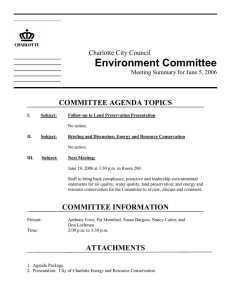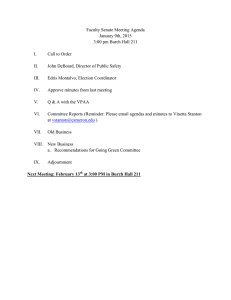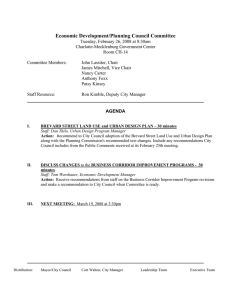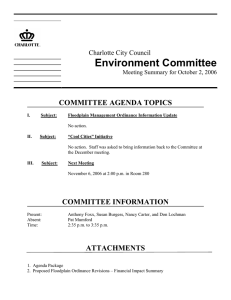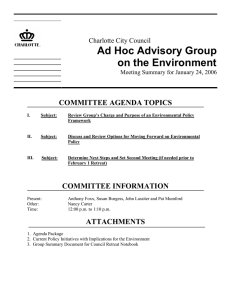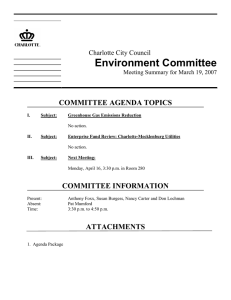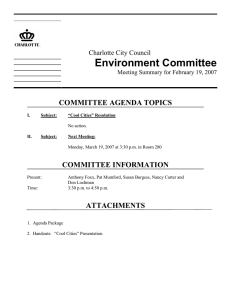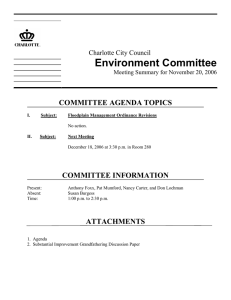Environment Committee COMMITTEE AGENDA TOPICS COMMITTEE INFORMATION Charlotte City Council
advertisement
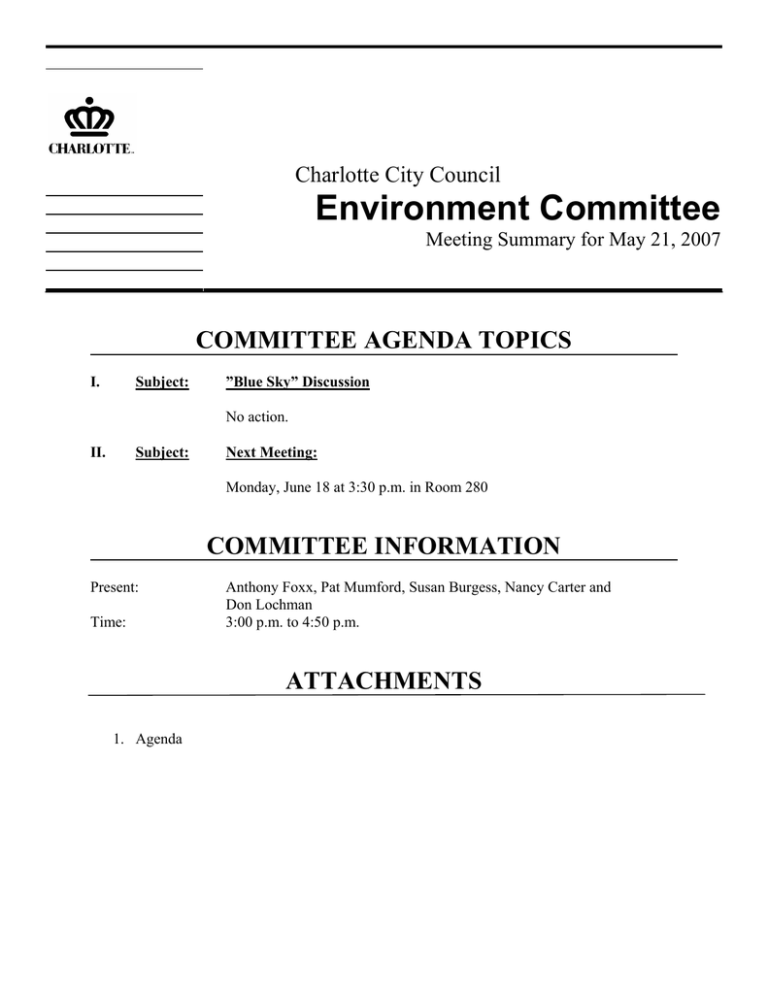
Charlotte City Council Environment Committee Meeting Summary for May 21, 2007 COMMITTEE AGENDA TOPICS I. Subject: ”Blue Sky” Discussion No action. II. Subject: Next Meeting: Monday, June 18 at 3:30 p.m. in Room 280 COMMITTEE INFORMATION Present: Time: Anthony Foxx, Pat Mumford, Susan Burgess, Nancy Carter and Don Lochman 3:00 p.m. to 4:50 p.m. ATTACHMENTS 1. Agenda Environment Committee Meeting Summary for May 21, 2007 Page 2 DISCUSSION HIGHLIGHTS Committee Discussion: Council member Foxx welcomed everyone to the meeting and asked those in attendance to introduce themselves. I. “Blue Sky” Discussion Council member Foxx advised that today’s meeting would start with viewing a PBS Special: “Eden’s Lost and Found: Chicago” followed by an open ended discussion on environmental issues particularly how we can improve our environmental quality. Council member Foxx continued that he had attended a conference last fall on Growing Greener cities and they showed a similar video spotlighting Philadelphia. He thought this video would be beneficial for the Committee to see to kick-off the blue sky discussion. [Video] The Committee members then took turns highlighting areas they would like to discuss further. “Blue Sky” Notes 1. 2. 3. 4. 5. 6. 7. 8. 9. 10. 11. 12. Where are we preserving land? a. Greenspace b. Tree save Maintenance of greenspace Focus on natural environment a. What we have today (streams, creeks, greenway system) Bring in “ultimate” urban planners Retrofit what we have Vision for future More collaboration with County and CMS a. Summit b. Work with private sector Catalog brownfields Economic Development Bike Trails, Walking Trails Award for Environmental Stewardship Energy audits a. Building efficiency Environment Committee Meeting Summary for May 21, 2007 Page 3 13. 14. 15. 16. 17. 18. 19. 20. 21. 22. 23. 24. 25. 26. 27. 28. 29. 30. 31. 32. 33. Green roof – CMGC Light bulbs Look at long-term return – value Identify our partners Opportunity for eco-tourism Use unexpected places Shouldn’t be hard to donate to land trust Youth in environment – get them involved/interested early) a. Tree planting Neighborhood based WiFi Suburban vs. urban Look to the river (Whitewater Center) Discovery Place Performance Contracting Affordable Housing Sustainable air and water quality Neighborhoods involved in tree canopy (June Blotnick) Community gardens Prescriptive vs. flexible regulations Incent “energy star” market Credit for environmental stewardship Preserve terrain Additional questions/comments for follow-up: Lochman: I have a concern with the summit, or anything that requires traipsing on County Commission territory. I think community awareness is good, but beyond that keep it simple, have high impact activities that you can go with. You can say this is budget, this is the managerial control, these will be the resources and this will be the benchmark to make sure it occurs. Otherwise, the interest dissipates. Whatever you do, it is important not to bite off more than you can chew. Burgess: Environmental projects should make good economic sense. Millennium Park is an example in Chicago – people travel to see what they have done with it. Mumford: Interesting, over a century ago there was a capitalist discussion about saving the lake shore. Today, everybody would say, don’t develop it. Today the challenge is in the context of time. Right now we don’t step back and say how will this be perceived in 20 or 30 years. Think back to the Green. It was done six years ago and at the time the cost per square foot was enormous. I would build it in a heart beat now. Always looking at the long term cost and value is difficult. We should be asking what is Environment Committee Meeting Summary for May 21, 2007 Page 4 the capital cost today versus the life cycle cost. The value does come back. Foxx: I know we are talking about expanding the recycling program, what material will be covered by that? I think there are categories that will be considered and categories that will not. Burch: All materials that are covered today will be covered. A piece of the Focus Area Plan is to change to single-stream recycling, so the customer doesn’t have to separate anymore. It would also be automated pick-up. It will require a capital investment, but it means the routes will go quicker so we can save some on the personnel side. As far as other materials, we can get that information to you. I do know single-stream is a much more userfriendly, efficient way to encourage recycling. Foxx: I have had some discussion with friends and today we recycle 1s and 2s only. The question coming in is why we don’t get the other categories. Burch: We are collections only, as you know the recycling piece is the responsibility of the County. We work closely with them. Part of what we recycle is a function of the market for the materials. I think that is changing, but we can get you more information. Burgess: One issue that I’d like to bring up that I’ve forgotten about is lead based paint. I know we have had aggressive efforts in the past, but I haven’t heard anything about this in a while. With so much renovation going on in our neighborhoods, I wonder if this is an issue we should consider? Foxx: Do we still have a program? Burch: Absolutely. We’d be glad to provide Council with the current status. We receive substantial grant money from the Federal government to assist with that so we have an aggressive program and can get you up to date. Burgess: I would also like an update on WiFi. I wonder if instead of taking the one offer we received if we should have done an RFP. Mumford: I think we need to ask how do you package the environment so the whole community sees the benefit. It might not be a direct benefit, but there are indirect benefits. There has to be a clear indication of why we should all be involved. In this region, we have the capital, we have institutions of higher learning, we have the work force, and I think we can be that area of the country that leads in design, development and distribution of clean technology, of sustainable products and services. If you start to see that is Environment Committee Meeting Summary for May 21, 2007 Page 5 part of where we are as a community, you start to attract like minds and start to build on this basics. We can be seen as a center of sustainability. Burgess: I think the Whitewater Center can help attract the creative class. We need to look to the future, look at development already out there. Foxx: Can staff look into performance contracting and tell me what that process involves? [Idea mentioned to CM Foxx from Don Reid.] Lochman: Don Reid mentioned it to me as well, but I didn’t understand it in the context of what we are talking about. But, performance contracting is huge. I’m not saying if it is good or bad, but we need more information. [Council member Foxx then opened up the discussion to the audience to contribute ideas.] Carter: Duke Energy used to have a program with community gardens. Can we look at that? Foxx: Off subject a little, but regarding the Palisades, I would suggest when we start discussing the Post Construction Controls Ordinance; we have one meeting in that area. It is a good place to take a look and see some of the different ways folks are dealing with stormwater issues and other things. One thing I’d like to ask about in the context of the PCCO is, to what extent our regulations are prescriptive in terms of what they require vs. flexible. And, the reason I ask it that way is because when you look at the Palisades you see different ways to address issues and I don’t know that they are any better or worse, but they look better than what the PCCO calls for. I need staff to help me understand. If we are regulating prescriptively and there may be better ways to do something, do our regulations require the less desirable result or is there flexibility for a better way to do something? We’ve got to encourage creativity and better results when we can. Burch: We will start that conversation at our next meeting in June. But, staff in the audience has heard your question loud and clear and will respond at that meeting. Carter: Make sure we are addressing clear cutting. We need to preserve the character of our city. Foxx: Thank you all for your time today. We have not had an opportunity for the Committee to just discuss issues. What are the next steps? Environment Committee Meeting Summary for May 21, 2007 Page 6 Burch: II. I think the next steps would be for staff to take the list and go back and compile some ideas. This is a very aggressive list, but we can come back at the next meeting and ask you to set priorities around the list about what you’d like to recommend to Council. Next Meeting: The Committee will meet on June 18, 2007 at 3:30 p.m. in Room 280. The agenda includes the first look at the Post Construction Controls Ordinance. Meeting adjourned. Environment Committee Monday, May 21, 2007 at 3:00 p.m. Charlotte-Mecklenburg Government Center Room 267 **NOTE TIME AND LOCATION CHANGE** Committee Members: Anthony Foxx, Chair Patrick Mumford, Vice Chair Susan Burgess Nancy Carter Don Lochman Staff Resources: Julie Burch AGENDA I. “Blue Sky” Discussion Staff Resources: Julie Burch and Rob Phocas The Council concurred with the Committee having a “Blue Sky” discussion to brainstorm new and additional ways the City might be a leader or participant in environmental matters. This discussion will be divided into two parts. The first part will be to watch the “Chicago” segment of the PBS “Edens Lost and Found” series. This 2006 series, which also spotlighted Los Angeles, Seattle and Philadelphia, discussed practical solutions to improve the environment and quality of life for cities. It showcased both community leaders and professionals in pursuing best practice solutions for urban environments. The second part of the meeting will be a facilitated discussion for Committee members to brainstorm and talk about Charlotte and the environment. After ideas and issues are identified, the Committee will be asked by staff to provide an indication of priority and any recommendations for next steps it may wish to make to the Council. II. Distribution: Next Meeting Agenda: Proposed Post Construction Controls Ordinance Mayor/City Council Mac McCarley Environmental Cabinet Pamela A. Syfert, City Manager Leadership Team Keith Henrichs Brenda Freeze Environmental GDP Stakeholders PCCO Stakeholders
